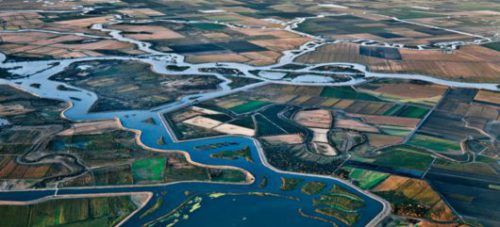Is state’s biggest new reservoir project already in trouble?
 The California Water Commission’s recent approval of nearly $2.7 billion in funding for new water conservation projects was the most dramatic move to promote storage of rainfall and melting snow in the state in decades. Such projects have been opposed by most Democrats for decades because of specific objections to feared environmental impacts and more general concerns that adding water capacity promotes growth.
The California Water Commission’s recent approval of nearly $2.7 billion in funding for new water conservation projects was the most dramatic move to promote storage of rainfall and melting snow in the state in decades. Such projects have been opposed by most Democrats for decades because of specific objections to feared environmental impacts and more general concerns that adding water capacity promotes growth.
Yet after harsh droughts for much of this century, state voters were ready for a new direction in 2014. They approved Proposition 1, a measure placed on the ballot by the Legislature which allowed for the issuing of up to $7.1 billion in state bonds for water infrastructure projects. After a lengthy review process, nearly 40 percent of these funds were allocated by the water commission last week for eight projects with the potential to add enough water capacity to serve more than 5 million households a year.
But skeptics have already made the case that by far the single biggest project – the Sites Reservoir in rural Colusa County north of Sacramento – actually suffered a setback in the water commission’s deliberations.
If built as envisioned, the project by itself would have been responsible for more than 60 percent of additional water storage statewide. Yet after the complex “public benefit” assessments that water commissioners used to decide how much each proposal got in bond funds, only $816 million was designated for the $5.2 billion Sites project – much less than advocates hoped. This means at the least that local water agencies and their ratepayers will have to pony up more more than they had hoped for construction.
This led Jim Watson, general manager of the Sites Project Authority, to tell the Sacramento Bee that it was possible that major changes lay ahead. If participating water agencies balk at higher costs, in the “worst case, we could build a smaller reservoir,” he said.
Commission, regulators differ on water availability
Yet the Sites Reservoir’s prospects are complicated by other factors as well. Key details of the reservoir’s construction plan have so far faced little direct criticism from environmentalists – perhaps surprising for what would be the biggest new reservoir to be built in California since the 1970s.
But as a Bee analysis noted, some environmentalists question the basic wisdom of the project. They cite the schism between the Water Commission’s conclusion that Sites could divert 500,000 acre-feet of water from the nearby Sacramento River each year and warnings from some state regulators that less water – not more – should be diverted from the river and the ecologically fragile Sacramento–San Joaquin River Delta (pictured).
One more obstacle also has less to do with Sites itself than the state’s fraught water policy fights. Critics of Gov. Jerry Brown’s California WaterFix plan – meant to shore up the state’s north-south water conveyance system – see Sites as an integral and thus objectionable part of Brown’s proposal.
The $17 billion project would build two 40-foot-wide tunnels to pump water from the Sacramento River some 35 miles south, where it would reach the water distribution network that allows wetter Northern California to provide much of the water used in desert-like Southern California.
The project appeared to be on the ropes until April, when the giant Metropolitan Water District of Southern California voted to commit its member agencies to covering $10.8 billion of the WaterFix tab – nearly two-thirds the total cost.
Brown is trying to win final approval of the project before leaving office in January. But Northern California environmental groups, local water agencies and farming industry groups are in a pitched battle to stall any final decision until after a new governor is elected.
Both remaining gubernatorial candidates – heavily favored Lt. Gov. Gavin Newsom, a Democrat, and Republican businessman John Cox of Rancho Santa Fe – are highly unlikely to embrace WaterFix if elected. Newsom thinks a smaller project makes more sense, and Cox is flatly opposed, according to the Restore The Delta website, which tracks candidates’ remarks on Delta issues.
Chris Reed
Chris Reed is a regular contributor to Cal Watchdog. Reed is an editorial writer for U-T San Diego. Before joining the U-T in July 2005, he was the opinion-page columns editor and wrote the featured weekly Unspin column for The Orange County Register. Reed was on the national board of the Association of Opinion Page Editors from 2003-2005. From 2000 to 2005, Reed made more than 100 appearances as a featured news analyst on Los Angeles-area National Public Radio affiliate KPCC-FM. From 1990 to 1998, Reed was an editor, metro columnist and film critic at the Inland Valley Daily Bulletin in Ontario. Reed has a political science degree from the University of Hawaii (Hilo campus), where he edited the student newspaper, the Vulcan News, his senior year. He is on Twitter: @chrisreed99.
Related Articles
With legal pot near, state looks to Trump administration for help on access to banks
With the legal sale of recreational marijuana a week away, local governments across California have adopted policies on where and
Burning Man bests perk-hungry regulators
A nerve-wracking negotiation with federal officials has been resolved in favor of the Burning Man festival, saving the organization behind the
California Now a 'Zombie State'
MAY 23, 2011 By JOHN SEILER In our 18 months online, we at CalWatchDog.com have detailed the massive burden of




